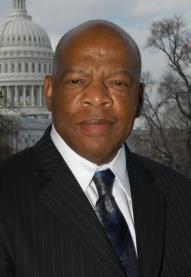
On July 22, 2020, the Senate introduced a bill to restore the Voting Rights Act. It’s named after John Lewis, the civil rights leader who served in the United States House of Representatives for Georgia's 5th congressional district from 1987 until his death in 2020. The Honorable John Lewis was the chairman of the Student Nonviolent Coordinating Committee (SNCC) from 1963 to 1966. He is known for being one of the main leaders who organized the 1963 March on Washington along with Martin Luther King Jr., James Farmer, Bayard Rustin, Roy Wilkins, Whitney Young, and Philip Randolph.
Lewis spent nearly 40 days in the Mississippi State Penitentiary at Parchman after the Jackson Police arrested him along with other Freedom Riders after they entered a “whites only” area of the city's segregated bus station and refused to leave. He was released from prison on July 7, 1961.
In 1965, Lewis led the first of three Selma to Montgomery marches. In an incident which became known as Bloody Sunday, police and state troopers attacked the marchers, including Lewis.
This bill is a response to the Supreme Court’s 2013 Shelby County v. Holder decision which set aside major parts of the 1965 Voting Rights Act, which eliminated barriers making it difficult for Blacks to vote.
Senators introduced legislation to restore the Voting Rights Act after it had its Federal oversight hand removed by the Supreme Court in the 2013 Shelby County v. Holder decision.
The John Lewis Voting Rights Advancement Act would require that any state with a history of voting discrimination within the past 25 years to seek federal approval before making any changes to its voting procedures. Additionally, it would require that any state regardless of its history, obtain clearance from the Justice Department or a federal court in Washington, DC, before making any changes that would tend to burden voters of color, such closing polling places in areas with large numbers of minority voters.
Lewis presided over the Democratic controlled House last year, when it passed identical legislation to restore the Voting Rights Act. Republicans did not take up the bill in the Senate, which has now been reintroduced and renamed after Lewis.
Lewis was brutally beaten by Alabama state troopers during the Voting Rights March in Selma. While most people must move through fear to find courage, Lewis said “I never felt fear, not once.” Lewis was the first to be beaten in the clash with state troopers, who fractured his skull with a billy club on the date that became known as “Bloody Sunday.” The televised images of the bravery shown by Lewis and other peaceful protesters and violence they encountered at the hands of law enforcement received national attention which helped lead to the passage of the original Voting Rights Act later that year. For the last two decades, Lewis led an annual march across the Edmund Pettus Bridge to kindle hope in the ongoing struggle for racial justice. On the 50th anniversary of Bloody Sunday in 2015, he made he made the trip with the nation’s first black president, Barack Obama.
Lewis was the son of sharecroppers. He devoted his life to expanding black voter rights and removing barriers to the ballot. A hardworking pacifist, Lewis stated, “Your vote is precious, almost sacred. It is the most powerful nonviolent tool we have to create a more perfect union.” You may listen to his stunning speech here.
Sen. Patrick Leahy (D-Vt.), the chief sponsor of the new legislation on July 22, 2020, said
“We cannot claim to honor the life of John Lewis if we refuse to carry on his life’s work or worse, if we stand in the way of that work.”
The bill was sponsored by Rep. Terri Sewell (D-Ala.) and initially called the “Voting Rights Advancement Act,” is a response to the Supreme Court’s 2013 Shelby County v Holder decision invalidating key parts of the landmark 1965 Voting Rights Act, which eliminated barriers making it difficult for African Americans to vote.
The decision in Shelby County v. Holder struck down federal oversight of the Voting Rights Act in nine states, which some believe opened the door for significant voter suppression through voter laws which do not have Federal oversight, which the bill is aimed at rolling back.
The bill passed with the votes of 227 Democrats and one Republican in December, with Lewis presiding over the vote.
On July 22, 2020, the House voted by unanimous consent to approve a measure, proposed by House Majority Whip James Clyburn (D-S.C.) to rename the bill the “John R. Lewis Voting Rights Advancement Act.”
What You Can Do
I am an aggressive and compassionate employment law attorney who is experienced in successfully representing persons who were subjected to racial harassment and retaliation in the workplace and/or were fired. If you have experienced racism at work, or if you reported it and no action was taken, if you are thinking of resigning, or think you will be fired, or have been fired, it is important that you consult with an attorney who is experienced in discrimination.
If you are being subjected to workplace discrimination, contact Hope A. Lang, Attorney at Law today for a free consultation.
Hope A. Lang, Attorney at Law serves clients throughout New Jersey, including Bergen, Middlesex, Essex, Hudson, Monmouth, Ocean, Union, Camden, Passaic, and Morris Counties with locations in southern, central, western and northern NJ to meet with clients.